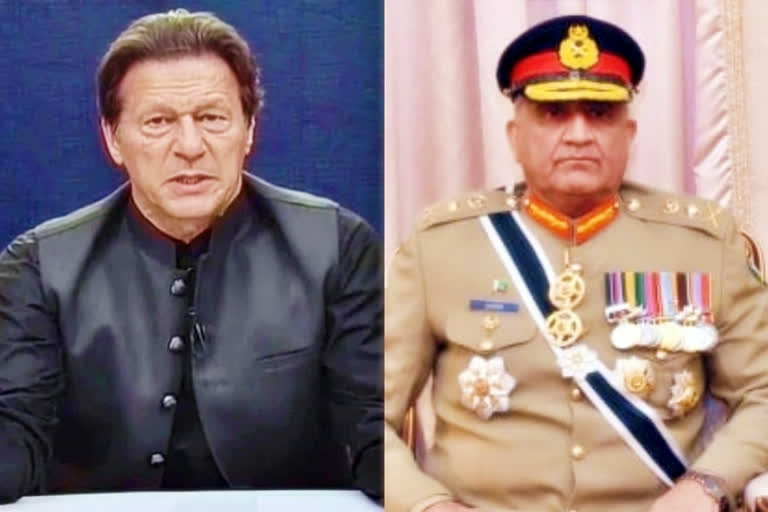The Russian military action in Ukraine has split the differences between Pakistan PM Imran Khan and Army chief General Qamar Javed Bajwa out into the open like never before, although, what appears to be a conflict between the two is actually a much deeper malaise that has not allowed democracy to strike deep roots.
A sensational cricket fast bowler in his heydays, Khan is a Pathan while the General Bajwa is of Jat lineage. Both individuals have distinct personalities that are strong-willed and not known to be particularly accommodative. Once propped up by the powerful Pakistani army, the legendary cricketer fell foul of the men in khaki over the issue of appointment of the ISI chief.
The most recent sign that underlined the unbridgeable gulf between the two was when both took opposite stands on the Russian military action in Ukraine but more importantly on the relations with the US and China. In contrast to PM Khan’s position, General Bajwa has spoken out strongly against Russia’s action in Ukraine.
Also read: In Islamabad, China mentions 'K-word' only in passing
Speaking at the Islamabad Security Dialogue on April 2 (Saturday), he said: “Sadly, the Russian invasion against Ukraine is very unfortunate… Despite legitimate security concerns of Russia, its aggression against a smaller country cannot be condoned.” But in—very strangely—saying that Pakistan wanted to have close ties with both China and the US, General Bajwa showed the Pak military was not quite sure of the direction it was to take.
“Pakistan enjoys a close tragic relationship with China demonstrated by our commitment towards Pakistan, China Pakistan Economic Corridor. Equally, we share a long history of excellent and strategic relationship with the US, which remains our largest export market. We seek to broaden, expand our ties with both countries without impacting our relations with the other.”
The general is clearly seeking the impossible at a time when the world is being divided into two blocks—one led by the US and the other by the Russia-China axis. Seeking closer ties with the US at a time when the Imran Khan government pursued closer ties with China and Russia is clearly a development China—Pakistan’s main benefactor at the moment with a mammoth $60 billion investment in the China-Pakistan Economic Corridor (CPEC) project—won’t be happy about.
Also read: No-confidence motion cannot be rejected: Pakistan Chief Justice
China and Pakistan style themselves as ‘iron brothers’ who share deep military, strategic and economic relations. Already in a big financial mess, Gen Bajwa definitely cannot gloss over the fact that Pakistan needs Chinese funds like never before. On the other hand, on February 24 when the Russian military juggernaut was moving fast into Ukraine, PM Khan was in Moscow. Russian President Putin and Khan met for about three hours in what can be a signal to the world of closer ties.
Pakistan, like India and China, has refused to toe the US-led western line in condemning Russia for its Ukraine action. On the contrary, PM Khan on March 31 accused a ‘foreign country’—taking US’ name in an apparent ‘slip of tongue’—of conspiring to topple him in Islamabad.
And on Sunday (April 3), PM Khan named Donald Lu, a top US official dealing with South Asia in the US State Department, as the person who was involved in the ‘foreign conspiracy' to topple his government. Therefore, the strategic narrative of Pakistan at the moment is one of utter chaos.
Also read: China keeps a close watch on political turmoil in Pakistan



